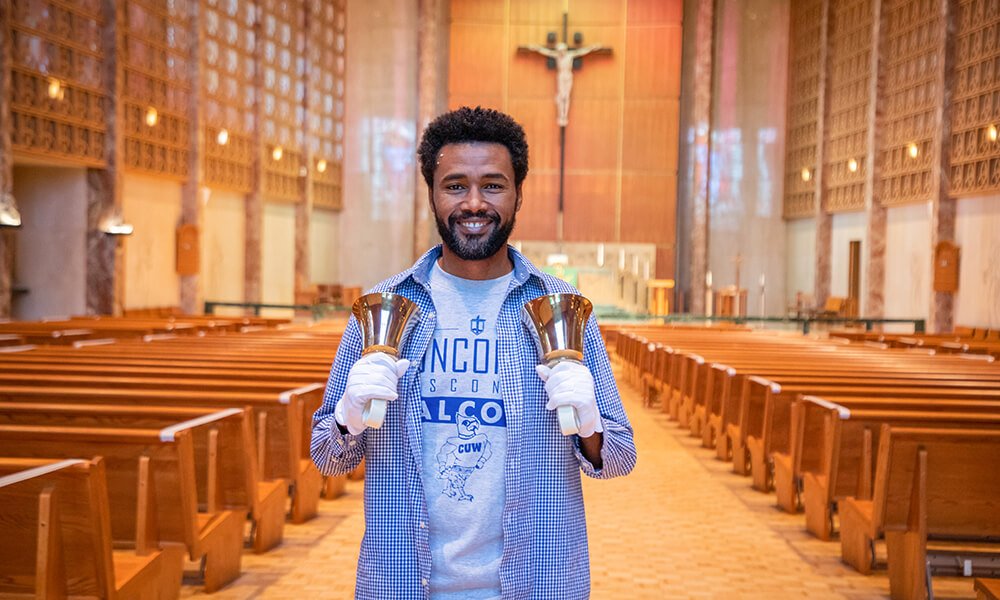
Amare Teklu Senbetu, who is enrolled in CUW's Master of Church Music program, aims to bring liturgical music to the Ethiopian Evangelical Church Mekane Yesus (EECMY), which has more than 5 million members.
Editor’s note: On August 17, 2021, flash floods struck Ethiopia’s capital city, Addis Ababa, where Mekane Yesus Lutheran Seminary and College—a partner congregation of The Lutheran Church-Missouri Synod—is located. Several people were killed in the floods, including the 20-month-old son of CUW student Amare Teklu Senbetu. The floods caused significant damage to the seminary, where Teklu also serves as dean for the school of music and media.
Those who wish to support Mekane Yesus Lutheran Seminary and College and all those who were affected by the deadly floods should visit their GoFundMe page.
Amare Teklu Senbetu is on a mission to ensure that the music of the Ethiopian Evangelical Church Mekane Yesus (EECMY)—which encompasses the largest Lutheran population of any individual member church in the world—brings glory to God and focuses the worshiper’s attention on the unchanging truths of Holy Scripture.
In order to learn the discipline of excellence in parish music, Senbetu spent six weeks on Concordia University Wisconsin’s campus this past summer in pursuit of his Master of Church Music degree. Senbetu serves as dean of the School of Music and Media at Mekane Yesus Seminary and College, the sole church music school in all of Ethiopia.
Senbetu has a tall task in front of him. As head of the program, he oversees the curriculum and programming for more than 180 students. While 180-plus students may sound like a significant number, the need is far greater. EECMY is made up of more than 14,000 congregations, and trained church music directors are sorely needed. In order to meet the demand, the school would need to graduate closer to 400 students each year, Senbetu estimates.
Yet, demand must not override substance.
“We are Lutherans, but we lack the Lutheran tradition of singing hymns in church,” explains Senbetu. “We want to keep liturgy in the church and keep what’s right in the church. Some people come to church to entertain themselves, but the words and their meaning should come first.”
Producing master teachers
The precipitous growth of the EECMY can partially be attributed to the music that has found its place in congregations, suggests Senbetu. Ethiopia has more than 80 ethnic groups, and each brings its own rich musical traditions. While the stylings are certainly a draw, the challenge is finding some kind of consistency in the delivery.
“Improvisation is big,” Senbetu says. “I doubt many people understand what the liturgy really is, and we want them to understand it because the liturgy helps ensure that we worship God in truth and give our praise to Him.”
Teaching church musicians the value of liturgy is one way to begin to help parishioners understand its importance. Senbetu is the first from Ethiopia to enroll in Concordia’s Master of Church Music program. His ultimate goal is to begin a faculty development program in Ethiopia to produce more “master educators” to better meet the demand.
The CUW difference
The learning curve, however, is steep. African music often follows a jazz style, whereas Concordia’s program is taught from a Western classical music tradition. The theories are almost entirely different, as Senbetu found over the summer.
“It’s a completely new discipline that I am studying here,” Senbetu says. “But this is a gap I recognize in our program and Concordia is the right place for me to grow.”
CUW has long held a strong reputation within the LCMS and beyond for its exemplary church music program. Directed by Dr. Alexa Doebele, the master’s program is intentionally delivered in summer sessions (or in combination with evening sessions) for the convenience of the learner. Two areas of emphasis are offered: organ or choral. The degree can be completed in as few as three years with the only on-campus requirement scheduled in intensive four-week blocks each June and July.
The program is designed to not only help learners perfect their musical abilities, but to deepen their understanding of how music ought to relate to theology, specifically in a worship setting.
“We want our graduates to know how to shape meaningful worship experiences for parishioners,” says Doebele. “It’s really a privilege to continue to provide churches with worship leaders and instrumentalists who appreciate the rich tradition of sacred church music.”
Learn more
Learn more about the requirements and admissions process for Concordia’s Master of Church Music program here.
— This story is written by Kali Thiel. Kali was Director of University Communications until April, 2025.
If this story has inspired you, why not explore how you can help further Concordia's mission through giving.